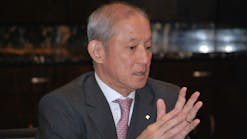Collaboration, digitalization key to sustainability progress
This week’s YNOW2024 conference in Houston drew industry professionals from around the world, including Yokogawa corporate leadership all the way from Tokyo. Among them was Koji Nakaoka, senior vice president and executive officer, and head of Energy & Sustainability Business Headquarters, Yokogawa Electric Corp.
Control’s Keith Larson had a chance to sit down with Nakaoka-san to discuss Yokogawa’s plans to help its customers to achieve their sustainability goals, and how that pursuit fits with Yokogawa’s own plans to make a meaningful contribution to society. Read on to learn more of what was said.
Q: Yokogawa has long been involved in the automation and optimization of both energy production and of the industries that are the biggest consumers of that energy. First, from the energy production side, what do you see as the greatest opportunities for Yokogawa to help develop carbon-neutral alternative energy sources?
A: When we imagine the year 2040, we must prepare for two scenarios in energy production. How can we support existing energy production and how can we contribute to the production of newly developed alternative energy?
In either case, we understand that we are expected to help produce energy safely and securely. In recent years, we have been working to expand our business in the renewable energy field. We would like to work on energy production that does not depend on fossil fuel-derived energy and steadily expand our company's portfolio. Key aspects include energy optimization and building systems that can accommodate power generation, power trading, and charging from the perspective of each stakeholder.
Q: When it comes to reducing energy consumption overall, what role does digital transformation and the IA2IA journey play in helping industrial organizations and society overall move toward net zero emission of greenhouse gases?
A: The IA2IA journey and digital transformation are very important keywords in our latest medium-term business plan. To realize the journey from Industrial Automation to Industrial Autonomy, we consider six progressive stages of development. These include Semi-Automated, Automated, Semi-Autonomous, Autonomous Orchestration, Autonomous Operation and Symbiotic Autonomy.
We believe that a step-by-step approach is necessary depending on each customer’s level of operational maturity. At the same time, in order to achieve the goal of net-zero emissions, we will work on optimizing production first and then the company as a whole. To achieve this, it is necessary to use digital technology such as digital twins to the maximum extent possible in production operations throughout the life cycle.
We will contribute to the realization of a resilient and sustainable society by supporting safe and optimal operations throughout the energy and water value chains, including production, supply, use, disposal, recycling and maintenance.
Q: From a regulatory and compliance perspective, it seems only a matter of time before real-time monitoring and reporting of greenhouse gas emissions will be expected—from company shareholders if not from governments. What is your take on emissions accountability, and how can Yokogawa help close the loop?
A: At Yokogawa, we believe that achieving our business goals will also result in positive contributions to society and the environment. Supporting a stable supply of energy using low-carbon technology, expanding services to realize a carbon-free society, and contributing to people’s well-being are important themes.
In this context, we believe that accountability for emissions is the minimum responsibility of a company. We have set life cycle assessment standards in our product manufacturing process and evaluate energy consumption, greenhouse gas emissions among other ESG metrics. We have already conducted surveys of inter-industry collaboration for the effective use of energy and resources at our facilities in Japan and Europe. These include the Goi district of Ichihara City, Chiba Prefecture in Japan, and in Port of Rotterdam in the Netherlands.
Individual companies in the petrochemical industry have generally highly optimized their own operations. But concerns about exposing confidential information often hamper them from looking 'beyond the fence' to work with other companies in an industrial cluster, even though this can yield further energy and resource savings. We believe that Yokogawa is in a good position to play an active role in realizing inter-industrial collaboration and optimizing industrial complexes while ensuring the confidentiality of this information.
Q: Are there particular industries or organizations that you see leading the charge on the energy transition front, and what role do you see Yokogawa technologies playing in that transition—both now and in the future?
A: We are not yet aware of any established industry or organization that can independently manage its energy transition. I believe that solid organizational progress will draw on the energy transition policies of each country, and draw on regional inter-industry collaborations. To be effective, these collaborations must not end as organizational surveys but progress to demonstration experiments as well.
I believe that the future business opportunity lies in how the data obtained from measurement and control can be translated into value.
Q: What has Yokogawa done to advance its own sustainability so far, and can you describe its roadmap for the months and years to come?
A: Yokogawa set sustainability goals in 2017 and six areas of contribution in 2021 to incorporate ESG perspectives into our business. The six areas of contribution are achieving carbon neutrality, improving efficiency in society & industry, optimizing plant lifecycle & protecting environment, improving health and safety, creating a resource-recycling ecosystem, and creating workplaces where people can fulfill their potential.
By achieving our business goals, we will also achieve our contribution goals to society and the environment. In LNG, which is a clean energy source, we have been promoting business throughout the LNG supply chain. We have also been working to expand our solution portfolio, including numerous acquisitions, in order to expand the renewable energy field.
One of Yokogawa's strengths is its ability to provide a comprehensive range of lifecycle services, from consulting to simulation to system implementation, operation and maintenance, enabling it to make viable, long-term proposals. Yokogawa will utilize its proven technologies to provide comprehensive carbon-neutral solutions and contribute to the realization of a sustainable society and enhanced competitiveness of the entire industrial complex.
About the Author
Keith Larson
Group Publisher
Keith Larson is group publisher responsible for Endeavor Business Media's Industrial Processing group, including Automation World, Chemical Processing, Control, Control Design, Food Processing, Pharma Manufacturing, Plastics Machinery & Manufacturing, Processing and The Journal.

